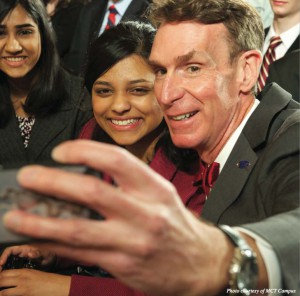
Jacob Jardel
Staff Editor
A famed science guy and a noted creationist scientist came together to debate their points of view at 6 p.m. on Feb. 4.
Hosted by CNN’s Tom Foreman at the Creation Museum in Petersburg, KY, the debate pitted Ken Ham, president/CEO and founder of Answers in Genesis, against Bill Nye, a scientist known for his work on an eponymous science show.
The debate hinged on the key question of whether creationist theory is a viable option to explain the making of the universe. While Ham’s point of view was based heavily in Biblical account, Nye’s centered on current evolutionary theory.
Foreman opened the debate by introducing the two debaters to the crowd before each speaker provided opening statements.
Ham, who had won the coin toss and elected to speak first, addressed the schism between current creationism and modern viewpoints of science, noting that there doesn’t have to be a schism. Using anecdotes from various scientist who believe in creationist theory, Ham concluded that terms like “science” and the like have been redefined to fit more non-religious viewpoints.
“Science has been hijacked by secularists,” he said.
After Ham’s opening statement, Nye started his, addressing the Biblical account of Noah’s Ark and debating the plausibility of such an occurrence. He also turned to fossil research to show how the layers of rock with no fossil crossover disprove flood-related accounts.
He concluded his opening statement with a request to the audience to not stray away from what he considers scientific advancement.
“If we continue to eschew science,” Nye said, “we are not going to continue to move forward.”
After Nye’s opening statement, each debater received up to 30 minutes to make his point about the validity of creationist views, starting with Ham’s defense of the viewpoint.
Ham proposed there does not need to be a differentiation between creationists and scientists by way of video anecdotes from various prominent scientists. Throughout his argument and the rest of the debate, he emphasized the difference between observable and historical sciences.
On the other side of the table, Nye posed that rock layers and fossil records disprove not only the plausibility of accounts regarding the ark but also the concept of a young age for the universe.
One of the main points he tried to make during the debate was the basic concept common throughout sciences, which he felt that creationism lacked.
“What we want in science,” he said, “is the ability to predict.”
Using this premise, he encouraged scientists to find things that either prove or disprove what scientists observe in the world as they see it today.
In the rebuttal stage, Nye said: “When we find an idea that doesn’t work, we throw it away. Bring it on.”
Overall, both scientists defended their topics with running themes, such as Nye’s drive toward finding what is predictable and Ham’s search for answers using Scriptural evidence.
Whether the themes were right or wrong, both debaters left with a more enlightened opinion on their opponent’s viewpoint.
